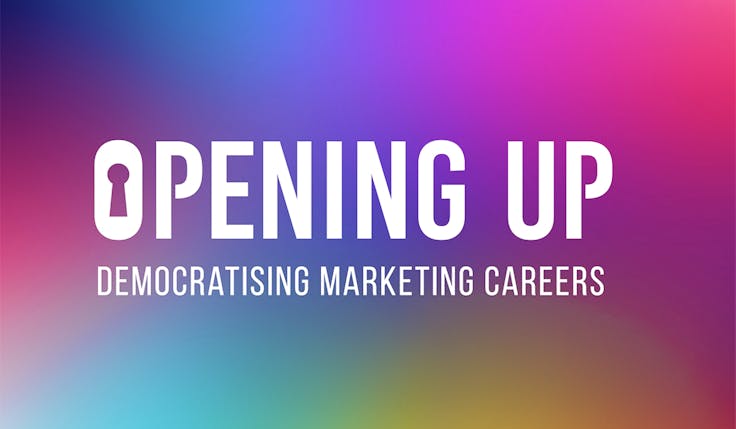‘An economic problem’: Brands urged to treat social mobility as a business imperative
Companies from the creative industries entering The Social Mobility Foundation’s annual Employer Index may be up 43%, but brands still need to raise their game.

Brands are being urged to address the socio-economic diversity of their workforce and stop seeing social mobility as a niche issue if they are to tackle the UK’s “productivity problem”.
“Lack of socio-economic diversity is not just a problem for working-class people missing out. It’s an economic problem, it’s a productivity problem,” Sarah Atkinson, CEO of The Social Mobility Foundation, tells Marketing Week.
Organisations in most sectors are worried about recruiting the employees they need to futureproof, she reports, explaining the issue extends beyond sourcing talent to the existing workforce.
“People from working-class backgrounds are underrepresented, but they’re not not there,” she explains. “They are there, they are working in your organisation. They could be rising to new challenges. They could be getting promoted. They could be building skills and growing productivity in your organisation.” But she suggests there are often unseen “barriers” preventing people from progressing, or staying within an organisation and letting them “reach every bit of potential”.
“That’s an under-productivity problem, that’s an underemployment problem and it’s one business is bearing even if it doesn’t necessarily realise it,” she adds. “That’s one of the reasons you need to take this issue seriously, because it helps you. This isn’t about finding new problems you haven’t got. This is about a problem you’re already experiencing.”
Socio-economic background stays with you and affects outcomes, attitudes, decisions, the way you’re seen and the way you see yourself all the way through your life.
Sarah Atkinson, The Social Mobility Foundation
The Social Mobility Foundation has, however, noticed a “turnaround” in two industries with previously poor records on socioeconomic diversity entering its 2024 Employer Index. The index assesses and ranks UK employers on the actions they are taking to open up to talent from all social backgrounds.
The number of firms within the creative industries entering the index rose 43% in 2024, while there was a 60% annual increase in entrants from the tech sector.
Brands such as agency group Dentsu (51st), PR firm Citypress (54th) and the BBC (65th) join the 2024 Employer Index, published today (16 October), alongside the likes of Amazon (47th), the Co-op (34th) and Aviva (15th).
Claiming joint first place are legal firm Browne Jacobson and professional services giant PwC UK. In total, 150 organisations nationwide – employing nearly 1 million people – applied for inclusion in the 2024 index.
Atkinson welcomes the influx of interest from the creative industries, explaining such firms are taking socio-economic diversity seriously and proving it is not “a niche issue”. The index’s release comes the same week the government named the creative industries one of the key areas of focus for its modern industrial strategy to “kickstart economic growth”.
While the turnaround is encouraging, Atkinson insists the work is only just beginning. She cites data that finds just 9% of workers in the tech sector and 26% in the creative industries come from a working-class background, despite the figure for the entire UK workforce standing at 39%.
‘Bring somebody else to the room’: Marketers on how to build a more inclusive industry
Worryingly, the Tech Talent Charter, a UK non-profit aimed at driving diversity and inclusion, closed in the summer citing a lack of industry commitment.
“There’s an assumption that tech will be great for social mobility, because it’s modern, much less formal in work practices, much less interested – one thinks – in qualifications or background. Much more interested in skills and a flexible, can-do attitude,” says Atkinson.
“In fact, all the data shows us tech is really weak for social mobility and yet there are not enough tech businesses taking it seriously.”
There are many hidden barriers within the tech sector she identifies, not least a “high risk, high reward attitude”, which can feel alien to people who have no financial safety net and can’t afford to take risks.
“Taking risks has not paid off for you and your family in the past, or you don’t have the inside knowledge to be able to recognise and play that sort of game. All of that can hold you back and it can mean you don’t present as the kind of person the tech industry wants,” Atkinson explains.
Practical steps
When it comes to making the workplace more accessible to people from diverse backgrounds, The Social Mobility Foundation CEO urges brands to make gathering socio-economic data a normal part of good business practice.
The foundation has developed a guide to help businesses enter the index, while the Social Mobility Commission has data toolkits available for firms keen to get started. Atkinson argues the process doesn’t need to be daunting and should feel like “business as usual”.
Looking at the index specifically, she explains brands don’t need to collect lots of data, or even have a social mobility network. They receive tailored advice and feedback as part of the entry process, which often reveals pockets of best practice.
“Lots of the organisations that are leading [the index] now didn’t start there. They started by getting in touch with us, getting the feedback and using that to focus, whatever their size, whatever their resource capability. They use the index entry to focus on: ‘How do we start this work?’” she explains.
This isn’t about finding new problems you haven’t got. This is about a problem you’re already experiencing.
Sarah Atkinson, The Social Mobility Foundation
The Social Mobility Foundation is also calling on the government to roll out mandatory data collection on socio-economic background for large employers, in the same way as gender pay gap reporting.
Some businesses have already answered the call. In July, the Co-op became the first UK retailer to publish its socio-economic pay gap. Calculating the pay gap between colleagues from professional and lower socio-economic backgrounds, the analysis found the Co-op has a mean socio-economic pay gap of 5.2% and a median pay gap of 0.2%.
The retailer has more employees from professional backgrounds working in senior leadership roles, while the biggest pay gap identified is for women from lower socio-economic backgrounds.
Kickstarting socio-economic pay gap reporting creates the opportunity for powerful conversations, says Atkinson, who notes how many people welcome the issue being put on the corporate agenda. These people might never have felt part of a “diversity conversation” or never felt the conversation was “really on the money” in terms of the barriers they have encountered.
“These can be quite powerful conversations, sometimes even quite emotional conversations, but they unlock things for organisations. They feel like they put some power into areas you might otherwise have completely neglected, which leads you to think about some quite simple things you could do. It doesn’t always have to be huge and complex, and take years,” she notes.
“Sometimes it can be quite simple things about the language we use or how early pay gets sorted out, or how you share information about opportunities or who you talk to.”
Never a case of ‘job done’
Atkinson wants brands to see embarking on this journey as both exciting and a means to “turbocharge” their wider diversity agenda. Index leader Browne Jacobson, for example, has made advances with its race equality work by prioritising social mobility, which has changed the legal firm’s recruitment pipeline.
It is, however, fundamental brands realise hiring talent from diverse socio-economic backgrounds is not a case of ‘job done’. Retaining this talent is crucial and often a corporate blindspot.
“Socio-economic background stays with you and affects outcomes, attitudes, decisions, the way you’re seen and the way you see yourself all the way through your life,” says Atkinson.
“That’s regardless of what your socio-economic status is now. You can be in a professional job, earning money, but your background still matters and is still affecting you in terms of how your career will pan out.”
‘Background to the foreground’: How the Co-op kickstarted socio-economic pay gap reporting
She explains all the evidence shows a person’s background stays with them for life, both in positive ways – in terms of pride and values – but also in ways that can make navigating corporate life challenging.
“It’s not all negative, but it’s absolutely with you all your life and no one should feel embarrassed about that or ashamed. It’s just a reality, we’re all a product of our background,” she adds.
“That’s why we normalise that conversation and say: ‘OK, how do we learn from you and where you’ve been to make this a richer, broader conversation in an organisation where everyone can thrive?’ That’s a really powerful conversation.”
 Marketing Week’s Opening Up campaign is pushing for the democratisation of marketing careers. Read all the articles from the series so far here.
Marketing Week’s Opening Up campaign is pushing for the democratisation of marketing careers. Read all the articles from the series so far here.






